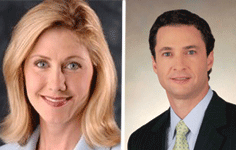After five years of litigation, GSK Hollywood Development Group had reached a tentative settlement with the City of Hollywood to allow its long-stalled condo project to move forward. But the deal fell apart last month, when GSK representatives learned they would not be able to build what the city previously agreed to, The Real Deal has learned.
In a Nov. 14 letter to Hollywood City Attorney Jeffrey Sheffel, GSK attorney Scott Marder accused city officials of reneging on the settlement deal and misleading his client.
“GSK has been met with nothing but betrayal and repeated misrepresentations,” Marder wrote. “By the time this case is finished, the city will write GSK a check approaching $30 million or more.”
In a separate unsigned letter sent to Hollywood Mayor Peter Bober three days later, the developer states it is willing to drop its lawsuit if the city buys the oceanfront land at the center of the dispute for $25 million.
“The city has made it impossible for us to develop our property,” the letter said. “It has zero development value or opportunity.”
Sheffel and Bober did not respond to requests for comment.
City spokesperson Raelin Storey disputed Marder’s claims. “We absolutely disagree with the characterization that the city reneged on the settlement offer,” Storey said.
In 2002, GSK paid $3.9 million for two sites on State Road A1A between Jefferson and Georgia streets totaling about 1.5 acres. According to state records, GSK’s managers are Michael Besso, Walter Fischer, Manuel Grosskopf, Jose Kavana and Daisy Sotolongo. The firm proposed a 15-story, 150-foot-tall condo tower, a plan that was met with fierce opposition from residents of the neighboring Summit building.
As a result, Hollywood commissioners restricted height limits to 65 feet in 2005. Four years later, GSK sued the city, claiming the downsizing reduced the value of the property and that the developer’s due process civil rights had been violated. In February, Broward Circuit Court Judge William Haury denied the city’s motion to dismiss GSK’s compensation claim.
According to Marder’s letter, GSK and city agreed to hold off on the trial, which was set for this month, after agreeing to settlement terms.
The city and GSK worked out a deal allowing the developer to build a 220-foot-tall tower with 80 residential units or 238 condo-hotel units, as well as obtain expedited permit approvals, city-funded street improvements, tax increment financing and a $1.2 million payment. Marder claimed the city told him and GSK’s principals that they could build the condo-hotel units without obtaining permission from Broward County.
That turned out to not be the case and the county rejected the proposal, Marder wrote.
Storey said Marder is incorrect about what city officials told him.
“The condo-hotel units were always dependent on county approval,” she said. “The county did not provide it.
